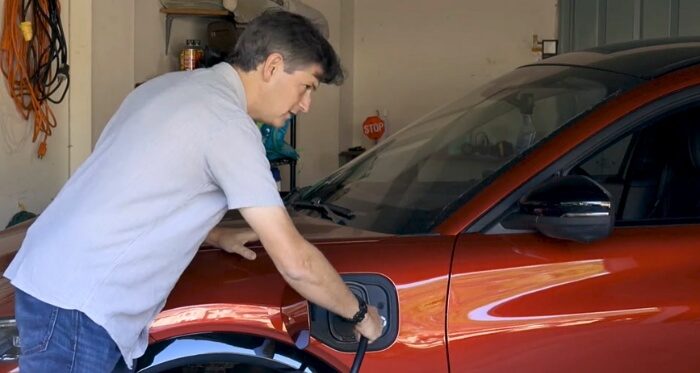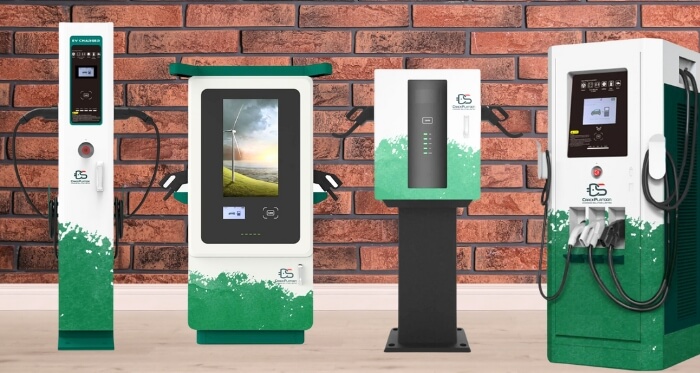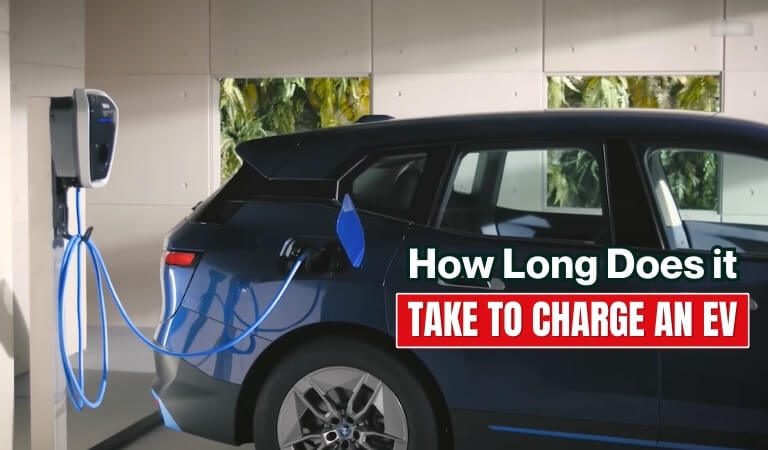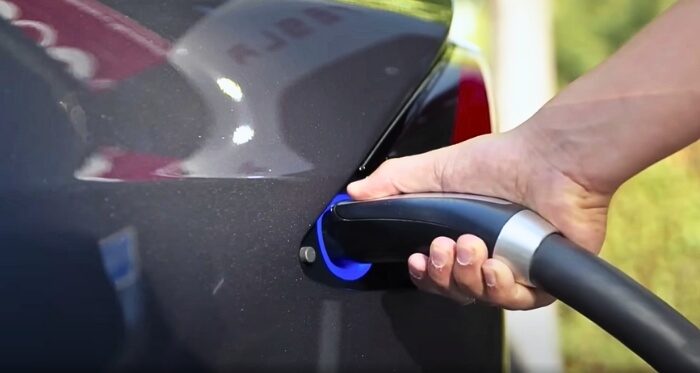Due to the massive emission of carbon, the climate change crisis has been a major fundamental issue for the world’s inhabitants. Fossil fuel vehicles are one of the major contributors to this phenomenon. So, making a change and taking some actions is required to reduce this scenario.
The introduction of EVs gives us a glimpse of hope to reduce the use of fossil fuel vehicles. Eventually impacting the overall climate crisis. Therefore, many are converting their mind to make a shift in their transport to EV and a related query comes to their mind “How long does it take to charge an EV?”
By pondering on the shades of EV charging, one can learn the facts related to the time to charge an EV. An EV charging station, having a capacity of 11 kWh, can take 8 hours to charge an EV whose battery capacity is 60 kW. The charging time is reduced for higher levels of charging stations and if the vehicle’s models are compatible with these levels.
Here, we’ll dive deeper into the factors that influence the time required for different EV charging, helping you make an informed decision for a greener tomorrow. So, let’s commence on this electrifying journey together and explore the world of EV charging.
The Basic Process Of EV Charging
The charging process of an EV is basically to refill the battery within the vehicle. The different models have different capacity of battery. They typically range from 10- 200kWh.

The most compact models like the Nissan Leaf or Chevrolet Bolt, often have capacities from 30-60 kWh. While midsize Tesla 3 or Ford Mustang Mach-E ranges from 50-80 kWh. Long-range or luxury EVs like Tesla Model S or Audi e-tron can have capacities exceeding 100kWh. The commercial model’s battery capacity can exceed 200kWh.
The battery capacity determines the estimated time taken for charging and the total output time for driving. An EV charging station is required for EV charging. May it be a home model for 3 or 4 users, rather it be a public model.
A vehicle is plugged with an EV charger in charging stations, it will communicate with the vehicle’s onboard charger to determine the appropriate charging rate. Then it supplies the necessary electrical power, gradually refilling the battery’s capacity.
The Types of EV Charging Methods In Bangladesh
Right now, there are three basic types of charging methods available in the market. These rely on the AC and DC charging methods. Other than that, solar charging can also be possible for the EV. The wireless method and ultra-fast charging methods are still in growth. Here we will briefly explain the three basic charging methods adopted by most EV charging suppliers.

Level 1 AC Charging
The simplest method of EV charging is the level 1 AC charging. Which involves using a standard household 120-volt outlet to charge your EV. While it’s the slowest option, it is convenient for overnight charging at home.
They typically range between 7-11kWh capacity. It caters to 20-24 miles of driving hours for the EV while charging from a level 1 charger.
The AMITY 21-AC Type charging pile offers versatile home charging with power options ranging from 7kW to 22kW. It’s compatible with Type1, Type2, and GB/T connectors. Its simple design allows for both wall-mounted and floor-standing installation.
With an IP54 protection level and minimal standby power consumption, it’s an efficient and reliable choice. Crackplatoon CSL Bangladesh is the provider of this product.
Level 2 AC Charging
This charging requires dedicated charging equipment and can be installed at homes, workplaces, or public charging stations. These chargers operate at 240 volts and offer faster charging.
Their charging range is between 7-22 kWh. They provide approximately 70-250 miles of driving hours. Many EV charger suppliers in Bangladesh offer Level 2 charging solutions for both residential and public use.
Another model from the Crackplatoon CSL Bangladesh is the MIHIR52-AC Type charging pile. Which is a highly versatile solution, accommodating power needs from 7kW to 43kW. It supports various connector types, including Typel, Type2, and GB/T. Its straightforward design allows for easy installation, and its IP54 dustproof and waterproof protection ensures durability.
DC Fast Charging
The fastest method of EV charging is DC Fast Charging, the effect of fast charging can vary and is commonly found in public charging networks, along highways, and in urban areas. They range from 50-350 kWh. Which reduces the time for charging for compatible vehicles.
These high-powered chargers can provide 100-300 driving hours. They are ideal for long trips and quick pit stops because of the less time required to charge with this method.
Crackplatoon CSL EV Charging also offers a DC Fast charging model. The RUMI71-DC Type electric vehicle charger is a cutting-edge solution with dual outlets, featuring a sleek design and user-friendly interface.
Its IP54 dustproof and waterproof rating ensures durability in extreme conditions. With power options ranging from 60kW to 240kW, it’s ideal for commercial spaces, charging stations, and office buildings. Its robust build and versatile installation make it a reliable choice for any
These are the three methods of charging now available, as we said there are growing prospects for new forms of charging in the future. For solar charging, you may not need any charging platform. But it may be less effective compared to these methods.
How Long Does it Take to Charge an EV?
To understand the full dimensions of an EV, the charging time required is one of the core knowledge that owners and buyers need to know. The duration of time is influenced by several factors. Conditions like the charger type, battery capacity, and charging methods are front-runner factors in determining the charging time. It’s not a critical process to swallow.

So, how long it takes to charge an EV is determined by the complete critical process and is affected by these certain factors. For instance, an EV model having a battery capacity of 13.8 kWh will take 4 hours to charge with a slow with a typical Crackplatoon CSL level 1 charging method that capacitates 3.7 kWh.
Here we will briefly explain the factors related to this process and the different time requirements for the various charging methods.
Charging Time Factors
Several factors contribute to the time it takes to charge an EV. These factors including the charger type, the battery’s current state of charge, the charger’s power output, and the EV’s maximum charging capacity dictate the required time for charging. It is important to know these factors for the owners and potential new users.
Level 1 Charging
As we already discussed about this method in earlier sections. This basic model takes 8-10 hours to refill an EV having a battery capacity of 7-11 kWh. Crackplatoon CSL in Bangladesh offers this type of charging station. This model is very useful for home charging stations. Where 3-4 users can typically build a station for their private use.
Level 2 Charging
A full charge on a Level 2 charger generally takes 7 hours for an EV that has a battery capacity of 73.5 kWh. Providing 42 miles per hour driving range. It is a convenient choice for daily use and longer stops.
Also, In Bangladesh, Crackplatoon CSL provides the level 2 chargers for the users of EV. These products meet all the criteria for a suitable EV Charging station in Bangladesh.
DC Fast Charging
The fastest charging method takes only 20-30 minutes to charge an EV with a battery capacity of 82kWh. If the capacity of the charging stations is 150 kWh.
An interesting fact is that the Crack Platoon CSL EV charging in Bangladesh caters the DC-type charging stations. A model suitable and features versatile options. So, you can consider this while opting for an EV charging station.
So, the basic equations stand as if you divide the battery capacity of the EV by the capacity of the charging station and multiply this by the time, then you will get the amount of time required for charging.
Breaking it down, the charging station’s capacity is 150kWh which means it provides 150 kW in 1 hour or 60 min. And battery capacity is 82 kWh which means it takes 82 kW of power per hour or 60 min. So the time to refill it fully will be (82150)60=32.8 mins.
This is how you can estimate the time required for the EV you use or wish to. It will give you the proper time for you to manage your charging time while operating the EV.
Is the Smart Charging Method Time Efficient Solution for an EV?
Yes, the smart charging method is a time-efficient solution for an EV, offering several benefits. They optimize charging times and help reduce energy costs while ensuring the vehicle is ready when needed. Here are the factors influencing smart charging efficiency.

Time of Use
It encourages charging during off-peak hours when rates are lower, promoting cost savings. This system can schedule EV charging to align with these favorable rates, making it more time-efficient and economical.
Grid Management
Also this method can communicate with the grid to balance electricity demand, reducing strain during peak periods. This grid interaction improves overall grid reliability and contributes to a more efficient use of resources.
Battery Management
They can optimize the battery charging process to extend its lifespan by avoiding frequent deep discharges. These are crucial for consistent EV performance and charging efficiency.
Remote Control and Monitoring
Smart charging platforms like Crackplatoon CSL Smart App enable remote control and monitoring of charging sessions in Bangladesh. Users of this region can start, stop, or adjust charging schedules from their smartphones, enhancing convenience and efficiency.
The Effective Charging Strategies of EVs for Long Trips
There are certain tips and tricks you can follow to manage the charging strategies effectively. Here we suggest these strategically sound tips for your smooth EV charging experiences.
- Plan Charging Stops: Plot your route and identify charging stations along the way, ensuring they are compatible with your EV’s charger type.
- Utilize Fast Chargers: Prioritize DC Fast Chargers for quicker charging during long trips, reducing downtime. A DC fast charger from Crackplatoon CSL in Bangladesh can be a suitable choice for fast charging options.
- Avoid Frequent Deep Discharges: Keep your battery state of charge within a reasonable range to optimize charging speeds.
- Time Charging During Breaks: Charge during planned breaks, like meals or sightseeing, to minimize waiting time.
- Download Charging Apps: Use mobile apps to locate charging stations, check availability, and monitor charging progress in real time.
- Calculate Range Margin: Leave a buffer in your estimated range to account for unexpected detours or weather-related changes.
- Consider Overnights: On very long journeys, plan overnight stays where you can charge at a slower rate.
- Optimize Speed: Maintain a steady, energy-efficient driving speed to maximize your EV’s range between charging stops.
Effectively managing your EV’s charging strategy during long trips ensures a smoother and more enjoyable travel experience.
Final Thought
Our search for knowing ‘How long does it take to charge an EV?’ is emphasized by the factors related to the questions. It varies based on factors like charger type and battery capacity. The slower Level 1 charging offers convenience for overnight charging, and the faster Level 2 chargers are suitable for daily use.
DC Fast Charging stations provide rapid refueling. Proper planning and knowledge of your EV’s capabilities are key to optimizing charging time. Interestingly Crackplatoon CSL in Bangladesh provides all types of EV charging stations. EV owners in Bangladesh can benefit from their services.
Also, we discussed the relevant charging stations and the capacity of charging EVs. We outlined the equations that can help you to find out the exact time required to charge your EV.
Inaccurate estimations can result in unexpected delays and frustration. Therefore, staying informed and planning is the smartest approach to ensure a seamless and efficient EV charging experience.
